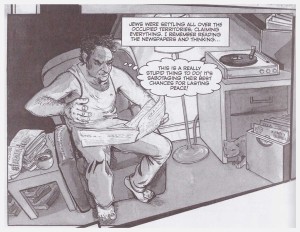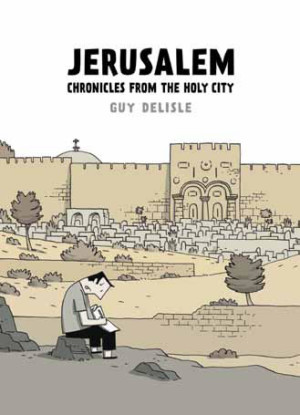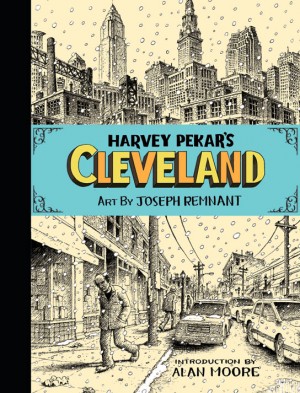Review by Karl Verhoven
Harvey Pekar is best known in comics for his autobiographical social observation, mythologising the minute details of day to day life and interaction within his long-running American Splendor comic. He was a polymath, though, and the single progressive characteristic that defines his output was a desire to learn, applied to both people and in the educational sense. He supplemented his income by writing reviews encompassing a broad cultural tableau, and towards the end of his career his comics work diverged into a second strand, of historical research, beginning with the collaborative Macedonia.
That theme continues here, as Pekar, brought up in the Jewish faith, but an atheist in later years, investigates some entrenched attitudes. An early piece of dialogue sets out his stall “I hope this book will change some minds, but I dunno. How can you change the minds of people who think they’ve a deal with God that goes back thousands of years?”
The polemic of the title is largely a marketing choice as the content is, until the final fifth or so, Pekar’s wide-ranging history of the Jewish people, incorporating diversions into other cultures where required for complete understanding. It’s spliced with Pekar’s memories and experiences of growing up in a Jewish household during the period when the Israeli state was constructed. The conversational manner in which this is imparted, coupled with the constantly adaptive art of JT Waldman, delivers an easily digested and informative density.
The entire conversation is deliberately set in first one of the largest second hand book shops in the USA, followed by a large Cleveland library, emphasising the discussion and revelations in the context of learning. Pekar’s eventually revealed opinions aren’t knee-jerk reactions, but informed and studied.
Waldman puts in an admirable shift, differentiating his styles according to the periods discussed. Pre-bibilcal and biblical eras are illustrated via methods approximating those of the era, and this theme is continued through to design elements from the 20th century. There’s a black and white mosaic for the time leading up to the birth of Christ, decorative Arabic styles for the section discussing Mohammed, a light grey wash for the unformed Harvey Pekar coming of age in the 1950s, and darker, tight pencils for the present day sequences. There’s also the playful use of a file motif indicating the period when Pekar worked as a file clerk.
One only has to peruse the Amazon comments section for this book to realise that for many Pekar’s conclusion is unpalatable. It’s that Israel has transformed from the beacon of hope it was in the late 1940s to a state unable to make a practical decision initiating meaningful peace. He highlights a widespread notion that supporting a Jewish state by definition precludes any questioning of the methods by which it’s maintained, and as long as this misguided attitude prevails conflict will continue.
There’s a touching epilogue, completed after Pekar’s death, in which his wife Joyce Brabner runs through her impressions of the Jewish traditions at her mother-in-law’s funeral. This segues into Pekar’s funeral in 2010.
Despite the grouchy persona Pekar presented in much of his material, his humanity informed what he wrote. His conclusions aren’t politically or religiously motivated, but a plea for cultural understanding and common sense. It’s certainly a job well done on his and Waldman’s part, so let’s hope it’s reached the receptive audience they intended.





